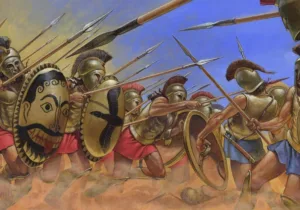April 9 was the anniversary of the executions of Pastor Dietrich Bonhoeffer and five fellow anti-Nazi conspirators in 1945 at Flossenbürg concentration camp. (A sixth, mentioned on the monument there, was executed several days later.) Bonhoeffer is celebrated in Christian circles for both his courage and his brilliant theological writings. But he was not the only Christian executed in that camp nor even the only theologian.
The most senior among the imprisoned conspirators was Admiral Wilhelm Carnaris, head of the Abwehr (German military intelligence) which enabled him for years to disguise and protect much of the anti-Hitler conspiracy. Nearly all the inmates hanged on April 9 worked for or with Carnaris, including at least indirectly Bonhoeffer, who was self-admittedly part of the Admiral’s “political information service.” The discovery of Carnaris’ revealing diary on April 4 had prompted Hitler personally to order the Abwehr prisoners’ execution.
Also among them was Carnaris’ deputy General Hans Oster, who had recruited Bonhoeffer into Abwehr service. The son of a pastor in the French Protestant church in Alsace, Oster had devoted years to the anti-Hitler plot. He was arrested in 1943 for shielding Abwehr officers helping Jews. One conspirator described Oster as “a man such as God meant men to be, lucid and serene in mind, imperturbable in danger.” Over two years before execution, Oster was one of several Christian friends in the resistance to whom Bonhoeffer wrote a famous letter of reflection about a decade under Nazism, saying:
Who stands firm? Only the one for whom the final standard is not his reason, his principles, his conscience, his freedom, his virtue, but who is ready to sacrifice all these, when in faith and sole allegiance to God, he is called to obedient and responsible action; the responsible person, whose life will be nothing but an answer to God’s question and call.
In this spirit, General Friedrich von Rabeneau, an army archivist, was directly motivated to turn against Nazism early in the 1930s due to his Christian faith. A member of the Order of St. John, a Protestant chivalric and charitable order, he eventually was forced out of the military after which he studied theology at the University of Berlin, until his arrest. He was executed six days after Bonhoeffer and the others. Their deaths were preceded by beatings, torture and degradation. Their sufferings resembled what many Christian martyrs have endured across centuries.
Like most martyrs, they were not consistent saints. Most had initially acquiesced to Nazi rule and evolved into heated opposition amid the regime’s rising criminality. Unlike Bonhoeffer, a pastor, the military men directly had to betray their solemn military oath to Hitler as commander, which they undertook with grave responsibility. They also had their personal vices. General Oster, the pastor’s son, was infamously fond of fast living, fast women and fast horses.
Yet during one of humanity’s darkest nightmares, they courageously withstood the flood tide of mass murder and madness, at near daily lethal risk to themselves and their families across years, to work for their nation’s redemption, knowing the overwhelming odds against them. They mostly represented Germany’s old Protestant aristocracy, and they believed in a faded Christendom whose transcendent order was the only defensible spiritual alternative to police state totalitarianism. Their patriotism was deep. But unlike the prevailing pagan nationalism rooted in blood, race and pseudo-science, the Flossenbürg martyrs knew their country belonged to God.
Their example of sacrificial duty and faith unto death is instructive in every time and place for Christians who serve their country and community now but do so while peering ahead to a distant place not made with human hands.
The monument at Flossenbürg to the seven martyrs cites 2 Timothy 1:7: “For the Spirit God gave us does not make us timid, but gives us power, love and self-discipline.”







 Live in the DC area? Sign-up for Providence's in-person events list!
Live in the DC area? Sign-up for Providence's in-person events list!